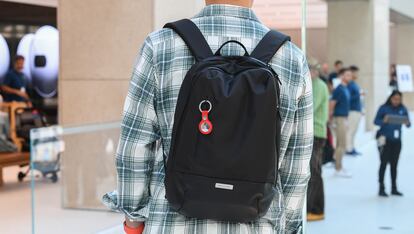How AirTags turned into spies
The tracking devices can be used to follow their owners, according to social media users and experts

There’s no worse feeling than losing something, especially if the item is valuable. Tracking devices offer a solution for those who have the ability to lose the remote control in the crevices of the sofa. They are easy to use: once the object they are attached to is lost, the owner searches for them via the mobile application. The devices use wireless signals, and once they are within range of the telephone, they can play a sound and their location appears on a map. But what happens when a tracker is used to locate people?
Apple reached the tracker market later than other companies. Manufacturers including Chipolo and Tile had been selling the devices since 2013. But as it tends to do, the company popularized the existing technology. It presented its AirTags in April 2021, and though the tech giant has not shared specific sales data —the devices are encompassed by the successful category of “wearables”— the small devices quickly became popular among iPhone users.
The Cupertino corporation fine-tuned the technology, allowing users to locate devices with a precision of a few centimeters. But with the success of the AirTag, another unexpected controversy arose: some began using them for other purposes.
When people are tracked
The devices are tiny tablets that can be easily hidden almost anywhere. The idea is that they can be stored in backpacks, or even wallets, noticeable only once activated. But their small size can easily turn them into a tool for tracking people. That happened to a 24-year-old Californian who, when she arrived at a friend’s house, received a strange alert on her iPhone: “An AirTag has been detected near you.”
@_ashleyscarlett This is something you see in movies 🥺😣🤯😱 #fyp sextrafficking
♬ original sound - ash 💕
The young woman found that the device had been following her for hours, making her movements visible on the Find My iPhone app. She discovered the AirTag tucked behind her car’s license plate, and she filmed a TikTok that immediately went viral. The question was inevitable: with such a popular device, how many people are being watched without their consent?
Safety measures implemented by Apple
Apple didn’t take long to respond to the incident and update the software accordingly. Now, users receive an alert whenever an unknown tracker is detected around them. The manufacturer warns that security forces can request a tracker’s history if it is used fraudulently. Should we, then, be concerned about the possibility of being tracked with one of these devices?
“From my perspective, no,” says Federico Vadillo, a security expert at Akamai. “Many technologies can be used for dubious ends, and there has been a lot of concern about AirTags. But these devices now have multiple security measures to avoid inappropriate uses.” The California company has even released an application so Android users can also detect AirTags around them.
How to protect yourself from unwanted tracking
Despite Apple’s security measures, no one is completely protected from unwanted following. How can you protect yourself against it? The company has completely automatized the process, so the user only needs to pay attention to their notifications. “If we are Apple users, a message will appear indicating that we have an object that permits tracking by another person,” says Rafael López of Perception Point. “If we are Android users, we should download the app Tracker Detect.”
For those who want to make sure they’re not being followed, or who suspect they may be, the following steps are recommended:
Make sure your phone’s operating system is up to date. This protects users from new threats or security breaches. Manufacturers are constantly working on safeguarding operating systems against possible security threats. Whenever a new version is available, it is important to install it.
Pay attention to tracking notifications. In the case of AirTags and similar devices, the system will give an alert about an unknown tracker. In the case of AirTags, the notification is automatic. Tile has released an update that allows anyone who suspects that they are being followed to detect trackers around them. For non-Apple devices, it is important to respond proactively.
Check your belongings. In the case of the iPhone, the system will alert about unauthorized tracking, but additional measures include checking pockets, bags and other objects if you suspect that you are being followed.
Inform the authorities. If you discover a foreign tracking device in your belongings, it is always worth reporting it to the police. The systems can reveal their owner’s location.
Sign up for our weekly newsletter to get more English-language news coverage from EL PAÍS USA Edition
Tu suscripción se está usando en otro dispositivo
¿Quieres añadir otro usuario a tu suscripción?
Si continúas leyendo en este dispositivo, no se podrá leer en el otro.
FlechaTu suscripción se está usando en otro dispositivo y solo puedes acceder a EL PAÍS desde un dispositivo a la vez.
Si quieres compartir tu cuenta, cambia tu suscripción a la modalidad Premium, así podrás añadir otro usuario. Cada uno accederá con su propia cuenta de email, lo que os permitirá personalizar vuestra experiencia en EL PAÍS.
¿Tienes una suscripción de empresa? Accede aquí para contratar más cuentas.
En el caso de no saber quién está usando tu cuenta, te recomendamos cambiar tu contraseña aquí.
Si decides continuar compartiendo tu cuenta, este mensaje se mostrará en tu dispositivo y en el de la otra persona que está usando tu cuenta de forma indefinida, afectando a tu experiencia de lectura. Puedes consultar aquí los términos y condiciones de la suscripción digital.









































